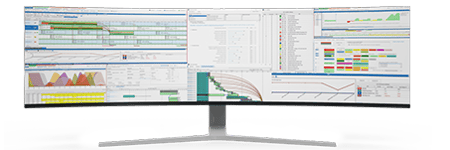
Resilience and Risk Management in Food and Beverage Manufacturing
In food and beverage manufacturing, resilience and risk management are more than just buzzwords—they are critical components of operational success. Production planners face an array of challenges, from fluctuating demand and supply chain disruptions to stringent regulatory requirements and shifting consumer preferences.
To navigate these complexities, organizations must adopt strategies and technologies that not only enhance operational efficiency but also foster agility and resilience. One such approach involves integrating advanced planning solutions like PlanetTogether with enterprise systems such as SAP, Oracle, Microsoft, Kinaxis, or Aveva.

The Importance of Resilience and Risk Management
Resilience in manufacturing refers to an organization's ability to anticipate, prepare for, and adapt to disruptions while maintaining continuous operations. Risk management, on the other hand, involves identifying potential risks and implementing measures to mitigate their impact. For production planners, these concepts translate into maintaining stable production schedules, optimizing resource allocation, and ensuring timely delivery of products, even in the face of unforeseen challenges.
Key risks in food and beverage manufacturing include:
Supply Chain Disruptions: Delays or shortages in raw materials can derail production schedules and lead to missed deadlines.
Regulatory Compliance: Non-compliance with food safety and quality standards can result in costly recalls and reputational damage.
Demand Volatility: Rapid changes in consumer demand can lead to overproduction or stockouts.
Operational Inefficiencies: Unplanned downtime, equipment failures, and labor shortages can impact productivity and profitability.
To address these risks, production planners must adopt a proactive and integrated approach to planning and decision-making.


The Role of Integrated Planning Solutions
Modern manufacturing environments demand more than siloed planning tools. Integrated planning solutions like PlanetTogether, when paired with enterprise systems such as SAP, Oracle, Microsoft, Kinaxis, or Aveva, provide a unified platform for managing production schedules, inventory, and supply chain operations. This integration enhances visibility, collaboration, and decision-making across the organization.
Enhanced Visibility and Collaboration
Integration between PlanetTogether and enterprise systems creates a seamless flow of data across departments. For example:
Real-Time Data Sharing: Production planners can access up-to-date information on inventory levels, supplier performance, and order status, enabling more accurate and responsive planning.
Cross-Functional Collaboration: Teams in procurement, logistics, and production can collaborate effectively, ensuring alignment of goals and priorities.
Scenario Planning and Risk Mitigation
Integrated solutions enable production planners to model various scenarios and assess the impact of potential disruptions. Features like what-if analysis and predictive analytics allow planners to:
Evaluate alternative production schedules and resource allocations.
Identify bottlenecks and risks before they escalate.
Develop contingency plans for various risk scenarios.
For instance, if a key supplier faces a delay, planners can use PlanetTogether’s capabilities to adjust production schedules and reallocate resources, ensuring minimal disruption.
Improved Demand Forecasting
Integration with enterprise systems enhances demand forecasting by combining historical sales data, market trends, and real-time insights. Advanced algorithms in solutions like Kinaxis or SAP Integrated Business Planning (IBP) improve forecast accuracy, helping planners:
Align production schedules with demand fluctuations.
Minimize waste and reduce holding costs.
Meet customer expectations for on-time delivery.
Compliance and Quality Assurance
Food and beverage manufacturers must adhere to strict regulatory standards. Integrated systems streamline compliance by:
Automating quality checks and documentation processes.
Tracking and tracing raw materials and finished goods throughout the supply chain.
Providing real-time visibility into compliance metrics and audit trails.
For example, integration with Aveva’s digital solutions can enhance traceability and ensure adherence to industry standards.

Building Resilience Through Integration
To achieve resilience, production planners must leverage the full potential of integrated planning solutions. Here are some practical steps to get started:
Conduct a Risk Assessment
Identify and prioritize risks specific to your manufacturing environment. Use tools within PlanetTogether and integrated enterprise systems to assess the likelihood and impact of these risks.
Optimize Resource Utilization
Leverage real-time data and advanced analytics to optimize the allocation of labor, equipment, and raw materials. Integrated systems provide insights into capacity constraints and help planners make informed decisions.
Embrace Predictive Maintenance
Unplanned downtime can disrupt production schedules and increase costs. Integration with systems like Microsoft Dynamics 365 or SAP Predictive Maintenance can help monitor equipment health and schedule maintenance proactively.
Strengthen Supplier Relationships
Collaboration with suppliers is essential for mitigating supply chain risks. Integrated platforms facilitate real-time communication and enable better coordination with suppliers to ensure timely delivery of raw materials.
Invest in Workforce Training
Technology is only as effective as the people using it. Invest in training programs to ensure that production planners and other stakeholders can effectively use integrated planning solutions.
Resilience and risk management are no longer optional in food and beverage manufacturing—they are essential for long-term success. By integrating PlanetTogether with enterprise systems like SAP, Oracle, Microsoft, Kinaxis, or Aveva, production planners can gain the tools and insights needed to navigate uncertainty and drive continuous improvement.
The ability to anticipate and adapt to change will define the leaders in the field. Integrated planning solutions provide a solid foundation for building resilient operations that can withstand disruptions and capitalize on opportunities. For production planners, the time to act is now.
By embracing integrated planning solutions, production planners in the food and beverage industry can transform challenges into opportunities and position their organizations for sustainable growth. Start your journey towards resilience and risk management today.
Are you ready to take your manufacturing operations to the next level? Contact us today to learn more about how PlanetTogether can help you achieve your goals and drive success in your industry.
























LEAVE A COMMENT